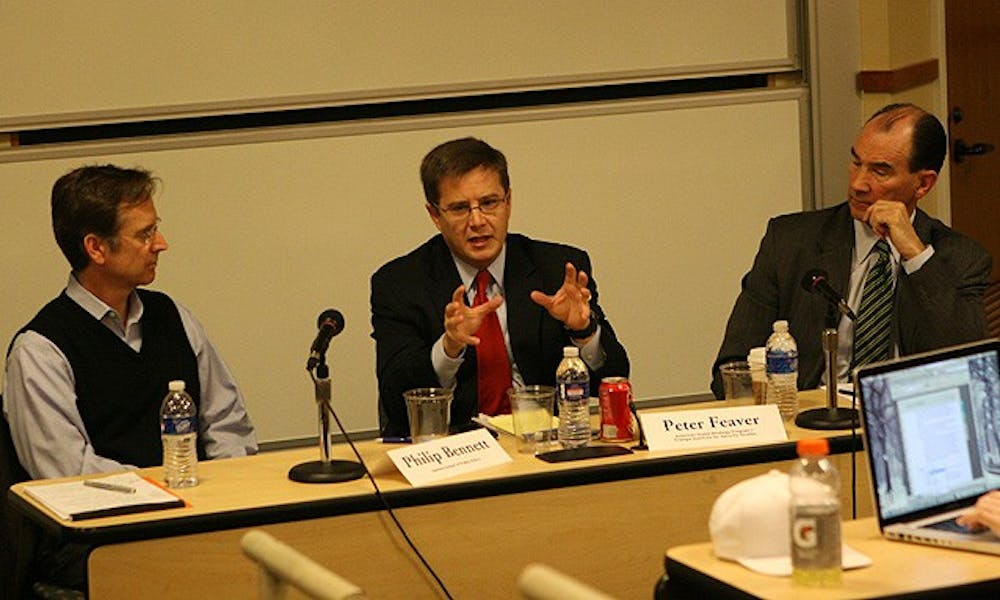WikiLeaks has broad and potentially negative implications for the future of the United States—particularly with respect to foreign policy initiatives and the sharing of information with the public, a panel argued Tuesday afternoon.
The University hosted a discussion concerning the recent release of more than 250,000 secret U.S. diplomatic cables by WikiLeaks, a non-profit media organization that publishes anonymous submissions of classified documents online. As WikiLeaks’ disclosures draws both praise and criticism around the world, the panelists drew from their professional backgrounds to analyze the organization’s effect on American foreign relations.
The discussion included Phil Bennett, Eugene C. Patterson professor of the practice of journalism and public policy and former managing editor of The Washington Post, Peter Feaver, Alexander F. Hehmeyer professor of political science, and Patrick Duddy, the U.S. Department of State’s diplomat in residence at the Center for International Studies and former U.S. ambassador to Venezuela. Gilbert Merkx, vice provost for international affairs, moderated the discussion.
Bennett opened commentary by comparing the situation to the leak of Pentagon papers in 1971, when a classified study of U.S. government policy in Vietnam was released to The New York Times, causing a political and media firestorm.
“The Pentagon Papers began a new kind of relationship between the press and the government, and now we have a new kind of controversy,” Bennett said.
Bennett considered the overall press coverage of WikiLeaks “responsible” and pointed out that the coverage of specific news outlets has depended on the level of access a media organization has to the documents. He noted, for example, that because The Washington Post has had less access to the leaked information than The New York Times, the Guardian or El País, it has focused more of its coverage on the controversy surrounding WikiLeaks.
“There are stories produced by content, both in terms of the [Iraq War Logs] and later diplomatic cables,” Bennett said.“ Other publications focus on the controversy of the leaks’ nature.”
Duddy, as a former diplomat, was more apprehensive of WikiLeaks and noted the potential harm it could have on American diplomatic efforts.
“From the point of view of the government, somebody with access downloaded a vast body of classified material and distributed it,” Duddy said. “That in and of itself was a criminal act and will be appropriately investigated.”
Duddy went further to say that such actions constituted “a much broader attack on the conduct of diplomacy.”
“It threatens the safety of some of those who risk a great deal in speaking to us at all,” he added. “It is profoundly irresponsible.”
Feaver outlined what he considered the “good, bad and ugly” surrounding WikiLeaks. Although it may be good for scholars outside of government who now have better access to information, it could be bad for the mainstream media to have WikiLeaks infringing on its territory, he explained.
“WikiLeaks makes the mainstream media somewhat irrelevant,” he said.
The question as to whether WikiLeaks would add another tier of knowledge to the public domain further spurred the discussion. Publishing large amounts of information without context often distorts rather than clarifies information for the general public, Duddy said.
“The public’s interest is not served, and people’s lives are endangered,” he added. “It’s very unfortunate.”
Feaver defended the importance of confidentiality in government action.
“In every other enterprise, we all intuitively and instinctively recognize the value of confidentiality,” he said, pointing to the “towering hypocrisy” of journalism as an example.
“The Washington Post is never going to tell us about their anonymous sources or their editorial conversations,” Feaver added.
Bennett emphasized the difference between WikiLeaks and the kind of analyses completed by traditional news organizations.
“Part of what journalists do and continue to do is come to a conclusion about the credibility of the information and the source,” he said.
Bennett also expressed his concern that the leaks and the potential prosecution of those who release them could have a “chilling effect” on future media activity and freedom.
“It could indirectly infringe on the freedom of the press,” he said.
Get The Chronicle straight to your inbox
Signup for our weekly newsletter. Cancel at any time.

